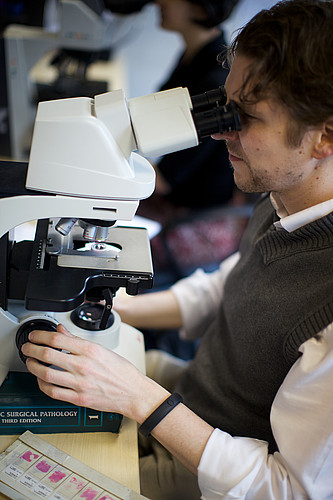Allergy & Clinical Immunology Medicine in the East of England
Allergy & Clinical Immunology is a rapidly expanding specialty with the increasing prevalence and diagnosis of allergic disease. There is therefore a corresponding need for an expansion in the numbers of suitably trained specialist in area . There is a burgeoning knowledge base, but much remains to be learned so there are many research opportunities, particularly in clinical areas.
Clinical knowledge and skills across a wide spectrum of systemic and organ specific pathophysiology are essential and contribute to the challenges of this specialty. It includes the application of a variety of interesting diagnostic techniques, challenge tests and treatments including immunotherapy, and monoclonal antibodies. Novel therapies are constantly in development.
Specialty from a trainee perspective
Training is based in a single centre, normally a teaching hospital. In the east of England, trainees are based in Addenbrooke’s Hospital. From a trainee’s point of view, this is one of the best centres to train in the UK, as it is a centre of excellence, with consultants who are leaders in the field of Allergy & Clinical Immunology, but are supportive and easily approachable. As a trainee you are encouraged to be involved in research, and gain a lot of experience within both fields.
Typical timetable:
|
Day of week |
Morning |
Afternoon |
|
Monday |
Food challenge clinic |
Admin/ research/ audit |
|
Tuesday |
Venom immunotherapy clinic Drug challenge clinic/ general anaesthetic allergy |
General allergy clinic |
|
Wednesday |
Difficult asthma clinic/pollen immunotherapy clinic |
General allergy clinic |
|
Thursday |
Venom clinic/ drug allergy clinic/ joint allergy, asthma and ENT clinic |
Admin/ research/ audit |
|
Friday |
General allergy clinic/ drug challenge clinic |
Admin/ research/ audit |
Advantages of Allergy & Clinical Immunology as a specialty
- Outpatient based specialty
- No on calls
- Varied clinical work - each day and clinic is different (immunotherapy, drug challenge, general allergy, difficult asthma)
- Incorporates many different specialties-immunology, respiratory, ENT, paediatric, dermatology, gastroenterology
- MDT approach - working with specialist nurses and consultants from other specialties
- Management of acute medicine e.g. treating anaphylaxis and exacerbation of asthma
- Single centre training- therefore do not have to rotate during the 5 years
- Part of training involves experience through short attachments in other specialties such as dermatology and immunology which may be at other centres
- Research - trainees are encouraged to take part in clinical research (writing papers and higher degrees) and in teaching
- High demand - there is an increase in the incidence of allergic disorders and the need for specialists is increasing, which should mean increased training numbers and consultant posts in the future. New consultant posts are being created.
- Job satisfaction- a large part of choosing a field is to have job satisfaction. Patients are very grateful as allergic disorders such as food allergy affect the activities of daily living.
The East of England Allergy & Clinical Immunology training programme is delivered at the Cambridge University Hospitals. The programme has high academic expectations of its trainees and research towards an MD or PhD is encouraged.
-
Completion of a core medical training programme or equivalent.
-
Documented evidence of achievement of level 1 competencies in general internal medicine (acute) and full MRCP(UK) Examination.
-
Good general medical experience; preferably including respiratory medicine
-
Excellent clinical skills
-
An inquiring mind
-
Dynamic and enthusiastic personality
-
The ability to work in a multi-disciplinary team
Allergic disease has increased substantially in the last three decades — the so -called 'Allergy epidemic'. At least seven million people have severe or multi-system allergic disease. Yet the specialty is small and there is much unmet need. There are therefore opportunities for service development. Allergy has been the subject of three independent national reviews, Royal College of Physicians 2003, House of Commons Health Committee 2004 and House of Lords Science and Technology Committee all recommending an increase in allergy services and a review by the DH 2006. It is expected that there will be expansion in consultant staff in coming years.
- JRCPTB: General Internal Medicine
- JRCPTB: ST3/SpR Allergy Medicine
- MRCP(UK) Examination: Home
-
The BSACI allergy guidelines are available here:http://www.bsaci.org/Guidelines/bsaci-guidelines-and-SOCC
Curriculum
The curriculum covers 14 topic areas: fundamental immunological knowledge, relevant laboratory experience, asthma, rhinitis, atopic dermatitis, food allergy, drug and vaccine allergy, insect venom allergy, urticaria and angioedema, anaphylaxis, latex allergy, allergen immunotherapy, paediatric allergy, unconventional therapies and immunodeficiency.
The curriculum is available here http://www.jrcptb.org.uk/sites/default/files/2010%20Allergy.pdf
No information available at present

